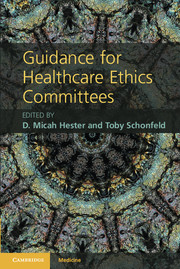Book contents
- Frontmatter
- Contents
- Contributors
- Preface
- Section 1 The Context of Healthcare Ethics Committee Work
- Section 2 Consultation
- Section 3 Policy Development and Organizational Issues
- 16 Ethics committees and distributive justice
- 17 Developing effective ethics policy
- 18 Implementing policy to the wider community
- 19 Ethics in and for the organization
- Section 4 Educating Others
- Index
- References
19 - Ethics in and for the organization
Published online by Cambridge University Press: 05 August 2012
- Frontmatter
- Contents
- Contributors
- Preface
- Section 1 The Context of Healthcare Ethics Committee Work
- Section 2 Consultation
- Section 3 Policy Development and Organizational Issues
- 16 Ethics committees and distributive justice
- 17 Developing effective ethics policy
- 18 Implementing policy to the wider community
- 19 Ethics in and for the organization
- Section 4 Educating Others
- Index
- References
Summary
Objectives
Recognize the HEC as one contributor to the ethical operation of the healthcare organization (HCO).
Identify the ethical implications of the structures, processes, and systems within which the HEC functions.
Suggest ways in which the traditional activities of the HEC contribute to the wider ethical enterprise of the HCO.
Propose additional tasks suitable for a proactive HEC.
Case 1: Hard choices
Nurse Elwood, a member of the St. Nowhere ethics committee, is nurse manager of the PICU, and is overseeing the discharge of Jimmy G, a ventilator-dependent 5-year-old. As the family is about to leave the unit, Jimmy’s mother asks the nurse a question that makes it clear that the family has not been adequately trained on the technology that will allow Jimmy to be maintained at home. The distressed discharging nurse comes to Elwood with a dilemma: she must choose between the welfare of her present patient, keeping him in the unit while further training the parents, and that of the new admission scheduled for Jimmy’s room later that day.
At the next committee meeting, Elwood describes the situation and expresses her concern at the difficulty the team had having to decide between two patients in need of the same bed. Further investigation reveals a pattern of prolonged ICU stays, resulting in decreased access to ICU care for other patients; and several other cases when a necessary delay in discharge disrupted planned resource allocation for the unit.
- Type
- Chapter
- Information
- Guidance for Healthcare Ethics Committees , pp. 147 - 154Publisher: Cambridge University PressPrint publication year: 2012



